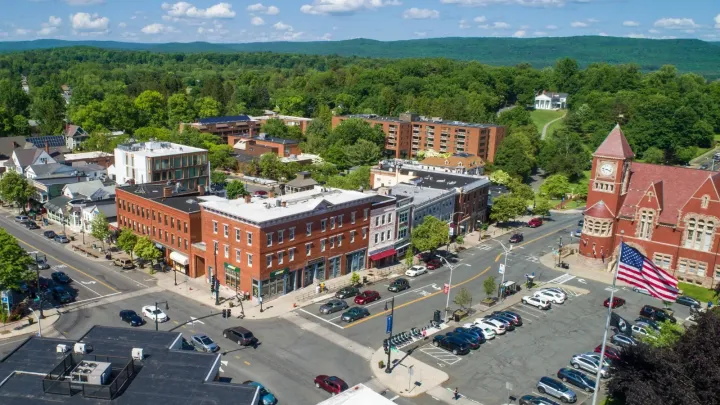Reflections and Insights: ACPD Returns to Val
Following student lobbying in 2021, ACPD offices were excluded from Valentine Dining Hall — they returned in Fall 2023. In an interview with President Elliott, Staff Writer Fritz Lalley ’25 discusses the administrative motivations for ACPD’s return.
Upon arriving back to campus after a semester abroad, I noticed an increased presence of police officers in the dining hall. At that moment, I was unaware that the college had prohibited the campus police from entering in prior years. Soon, I was informed by peers that this was, in fact, not something you would have seen in the past. I figured that this shift required an explanation. So, this past Thursday, I sat down with President Michael Elliott to discuss that shift. While the purpose of this article is to be short and informative to the reader, our discussion was reflective of a broader conversation around policing on the campus that I believe warrants further articles in The Student.
As written about in The Student, effective student lobbying in the spring of 2021 led to the initial decision to exclude ACPD officers from Valentine Dining Hall. There was a genuine concern on campus at the time that the college prioritized the police as the primary point of contact with students in the event of a tense situation. Following the murder of Duante Wright by a Minnesota police officer and spurred by the broader and evident anti-Black police brutality throughout the nation, many students argued for the disarmament or outright abolition of the ACPD. Furthermore, both the Black Student Union and the Association of Amherst Students (AAS) advocated for a drastic expansion of the Counseling Center, now called the Center for Student Counseling and Mental Health. The board of trustees ultimately rejected a motion to disarm, but ACPD officers were restricted from dining in Val, and the College created what is now known as the Campus Safety Advisory Committee (CSAC).
“As I understand, the decision to restrict the police from eating in Val was made at a moment when the campus was really trying to decide about the future of policing and what the model should be in the future,” Elliott said.
Yet, beginning in the fall of 2023, armed officers were once again eating in Val. I asked Elliott what he knew about this decision, and he informed me that it was ultimately a recommendation to him, after months of debate by the CSAC on whether or not to continue restricting access.
“Around the middle of last year, I started hearing about the discussion, and sometime shortly after received a recommendation that armed officers be allowed back into Val,” Elliot said. “And then later in that semester, after having talked with some of the individuals on the committee, decided to go forward and accept that recommendation.”
So, what was considered during meetings of the CSAC?
According to Elliott, much of the CSAC’s initial deliberation was driven by the essential question: “What does it mean to have certain members of our community excluded from a space, especially when it is the only dining hall and the epicenter of campus?”
Once the committee began debating this question, other issues with the policy became more clear. One of the major issues with restricting ACPD from entering Val had to do with employee benefits. Indeed, Amherst faculty can purchase food at Val at a discounted price. This cost is subsidized by the school, coming out to be roughly five dollars a meal. In other words, restricting ACPD from dining in Val is also, in practice, an effort to withhold employee benefits from a particular group of employees.
So, it appears that the decision to allow ACPD officers back into Val had much to do with the efforts of the college to foster an inclusive environment where all employees and students feel welcome and can access the benefits that they are entitled to, whether as students or employees.
Yet, many students experience a heightened sense of anxiety when presented with armed police. Some would even say that their presence makes them feel less safe. “We are aware that some students and faculty feel increased safety given the presence of armed police, yet, we now also know that some students and faculty in fact feel less safe,” Elliot said. Amidst this conflict, I asked the president how he, and the college at large, handles the responsibility of fostering an inclusive environment while also being attentive to the stressors and anxieties of the students and faculty.
“Really this entire process that goes back to before I arrived here has been about how we balance the two and achieve a sense of psychological safety as well as physical safety. The combination of the CSAC and ACPD is how we are trying to achieve that balance … we are constantly reviewing if we have that balance right. We want to be responsive to all the needs of the communities that we serve.”
His response was reflective of a broader trend regarding how the college is handling policing in 2024. That is, the college is pursuing a “dynamic” approach. When it comes to policing, the college is constantly grappling with new considerations and perspectives. Furthermore, the discussion of policing on campus is something that impacts students and faculty alike. After graduating from Amherst, many of us will never sit in a cafeteria again. We will, however, continue to exist in spaces where policing is evident. As a result, implications from decisions like these ones will therefore continue to affect us in many complex ways.





Comments ()